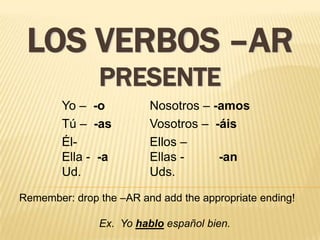
Verbos regulares presente, pasado, futuro
- 1. LOS VERBOS –AR PRESENTE Yo – -o Nosotros – -amos Tú – -as Vosotros – -áis Él- Ellos – Ella - -a Ellas - -an Ud. Uds. Remember: drop the –AR and add the appropriate ending! Ex. Yo hablo español bien.
- 2. HABLAR– FUTURO WILL SPEAK/TALK Yo – hablaré Nosotros – hablaremos I will speak we will speak Tú – hablarás Vosotros – hablaréis you will speak y’all will speak Él- Ellos – Ella - hablará Ellas - hablarán Ud. He/she/you will speak Uds. They/You all will speak To form the future of MOST –AR verbs, add the endings Shown in RED to the infinitive (unconjugated form).
- 3. EJEMPLOS DEL FUTURO: Mañana viajaré a Costa Rica. Tomorrow I will travel to Costa Rica. Ellos estudiarán en la biblioteca el viernes. They will study in the library on Friday. Nosotros llegaremos a las nueve. We will arrive at 9:00.
- 4. Gramática 2.5C -Práctica A Fill in the blanks with the correct form of the verb in parentheses in the FUTURE tense. (Write these in your notebook) 1. Los estudiantes ______(visitar) a Venezuela en abril. 2. Marta y Rosa _______ (comprar) el almuerzo el lunes. 3. Mañana, nosotros __________ (llegar) a casa a la una. 4. Yo _______(celebrar) la fiesta de Marcos el sábado.
- 5. -AR – PRETÉRITO Yo – -é Nosotros – -amos Tú – -aste Vosotros – -asteis Él- Ellos – Ella - -ó Ellas - -aron To form: Ud. Uds. •Drop –AR Ex. Yo hablé español ayer. •Add appropriate I spoke Spanish yesterday. preterit ending The preterit tense is used to express: • An action that is terminated or completed at a given point in the past • An action or state that occupies a limited period of time • An action with a specific and indicated beginning or ending
- 6. VERBOS QUE TERMINAN CON –CAR, -GAR, -ZAR Verbs that end in -car, -gar, and -zar have the following spelling changes in the first-person singular (YO form) of the preterit. **All other forms of these verbs are conjugated regularly. -CAR -qué Ex. tocar yo toqué -GAR -gué Ex. llegar yo llegué -ZAR -cé Ex. cruzar yo crucé This spelling change ONLY happens in the YO form!
- 7. EJEMPLOS DEL PRETÉRITO: Ayer Paco buscó el mercado y yo busqué el banco. Yesterday Paco looked for the market and I looked for the bank. Ellos bailaron en la fiesta anoche. They danced at the party last night. Yo estudié por una hora. I studied for an hour. Note: these have a definite period of time.
- 8. Gramática 2.5C -Práctica B Fill in the blanks with the correct form of the verb in parentheses in the PRETERITE tense. (Write these in your notebook) 6. Anoche nosotros _____ (escuchar) la radio. 7. Marta y Rosa no _____ (practicar) ayer. 8. El viernes pasado, tú ________(mirar) una película. 9. Una vez, yo ______(jugar) al ajedrez con el rey. 10.Marta _______ (contestar) tres veces ayer en
- 9. -AR – IMPERFECTO Yo – -aba Nosotros – -ábamos Tú – -abas Vosotros – -abáis Él- Ellos – Ella - -aba Ellas - -aban Ud. Uds. The imperfect tense is used to express: • A habitual action in the past (describes things that USED to happen) • INCOMPLETE /interrupted actions in the past (was/were ….-ing) • Descriptions of people, places, time, weather, age, etc. in past.
- 10. EJEMPLOS DEL IMPERFECTO: Manuel nadaba todos los días. Manuel used to swim every day. Tú mirabas la tele cuando llegó la familia. You were watching TV when the family arrived. Nosotros bailábamos todos los fines de semana. We used to dance every weekend.
- 11. Gramática 2.5C -Práctica C Fill in the blanks with the correct form of the verb in parentheses in the IMPERFECT tense. (Write these in your notebook) 11. Yo _______ (repasar) los verbos todos los días. 12. Ellas ________(viajar) a la playa cada verano. 13. Todos los días, tú ______(usar) computadora 9. 14. Cada año, Pablo ______ (cantar) en el coro. 15. Nosotros _______ (llamar) a mi abuela cada noche.